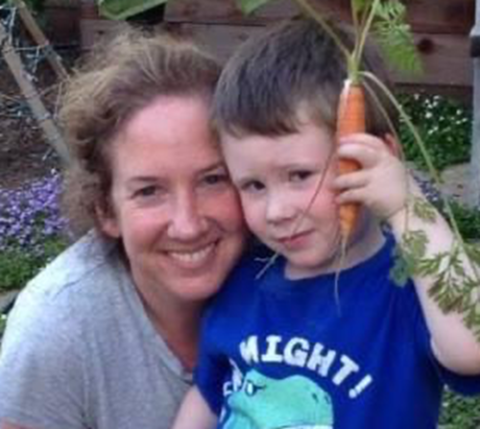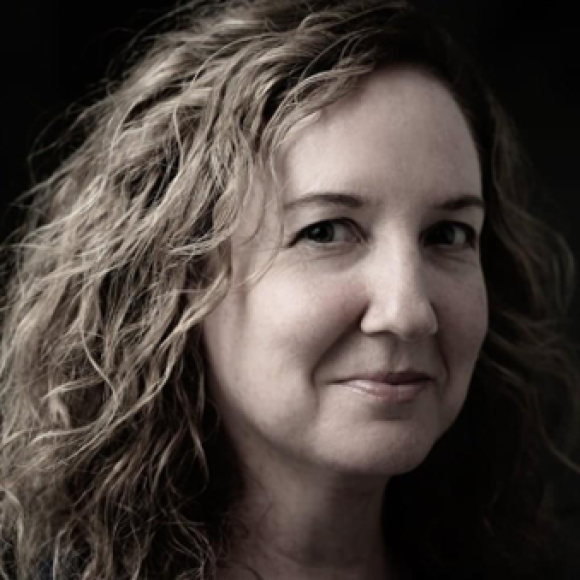In honor of her 15-year anniversary working at Amgen, Ingrid Rulifson created a post on Facebook that would lead to an unexpected chain of events. A classmate from high school, Tanya Buxton, saw Rulifson’s post and immediately connected—explaining that she taught AP biology and introductory biotech classes at a school nearby in the San Francisco Bay Area and used curriculum from the Amgen Biotech Experience (ABE). Rulifson was unfamiliar with ABE but was eager to learn more and to reconnect with this person from her past. That chance encounter would lead to a new friendship and a collaboration to help reach ABE students during the pandemic.
“Tanya said something like ‘this is a really difficult year; I teach this biotech course, and we've gone virtual and have to figure out assignments and projects for the kids to work on,’” Rulifson recalls. Together, they brainstormed on a project for the class, and Buxton also asked if Rulifson would mentor a student in her class. That discussion and year-long mentorship led to Rulifson visiting Buxton’s classroom, mentoring two more students this past year, and working on an immunology curriculum for an ABE Australia teacher.
“It’s been fantastic to reconnect with this old classmate of mine, while also being able to volunteer and provide mentorship to others,” says Rulifson, who is a principal scientist at Amgen San Francisco. “I think it has been good for my child to see me doing this and observe the response from the kids.”

Throughout her educational and career path, Rulifson has seen the need firsthand for a support system of mentors, and didn’t feel like she had many when she was younger. “These can be people who can help you understand things when maybe your teachers aren't getting through to you and you need to hear a concept in a different way or context,” she says.
While Rulifson was an upper-level student in high school growing up in the Palo Alto area, she remembers not having a lot of confidence. “Things just weren't kind of clicking with me early on,” she says. “I couldn't really see myself going into science because I didn't feel like a science kid.”
Her thinking changed a lot when an older friend of hers returned from college and was suffering from Hodgkin’s disease, a cancer of the immune system. “She got it twice, and the second time around, it was really bad and it made a huge, lasting impression on me,” Rulifson says. Through her friend, she witnessed the power of the mind–body connection and how that contributed to her friend’s recovery. Rulifson read up on the topic and would end up pursuing a psycho-biology degree at the University of California, Santa Cruz.
Once in college, Rulifson found a lot of joy and creativity in the lab. There, she felt she could troubleshoot and problem solve in new ways. Between her fourth and fifth years of undergraduate school, she did a 9-week cross-country bike ride as a fundraiser. A chance encounter on that trip led to befriending someone who, upon another chance encounter, would connect her with his father, an eminent immunologist when she was looking to explore a career in that field.
Rulifson would go on to work in that immunologist’s lab as a research technician for 3 years and then pursue a PhD in immunology at the University of Chicago. “That random encounter with my biking friend changed my life,” she recalls. After her PhD, she did postdoctoral work that would ultimately take her back to California and then to working at Amgen.
Rulifson’s biggest mentor on her path was her brother who had a PhD in biology. Not only did he have a lot of enthusiasm for what he did, which was infectious, she says, but he also taught her about the importance of presenting her research.
In her current position, Rulifson cultivates a culture of mentorship with her team, saying that the best days for her are when she sees the people on her team feel valued and successful. “I want to help my team find opportunities to do something meaningful, and it feels good when they see the benefit and feel positive about what they are doing,” she says. Rulifson leads a team in the early discovery research pipeline for targets that could lead to treatments for cardiometabolic disorders. Over the years, she has worked on a variety of therapeutic applications.
Her creative approach to experimentation and science enabled Rulifson to custom create projects with Buxton and her ABE students that have led to fruitful mentorship relationships. Most recently, she worked with students on a project to study the epigenetics of alcohol on fly progeny. She first had the students research epigenetics and alcohol and then educate her on the topic. They then talked through what a realistic experiment could look like—everything from the assays and controls to how to evaluate the endpoints and present the findings.
“These students are extremely sophisticated in both their thinking and their access to information,” Rulifson says. “They were very responsive and invested in doing a good job.”
In her work with the ABE Australia teacher on an immunology curriculum project, Rulifson is working to reach underserved students in the Sydney area. “I haven’t necessarily done immunology for the past 20+ years,” she says. “But I had a personal goal this year to brush up my immunology knowledge, so it’s a nice convergence of my personal goals with being able to help somebody else.”
In reflecting on her career path, especially in mentoring students, Rulifson notes that perhaps the most important part of her story is that “your life doesn't have to be set in stone based off what you know when you're 18 years old; you will evolve, develop, and grow.” Sometimes it takes a while to figure out a path, she says, making it important to seek opportunity, try things outside your comfort zone, and to give yourself time.
